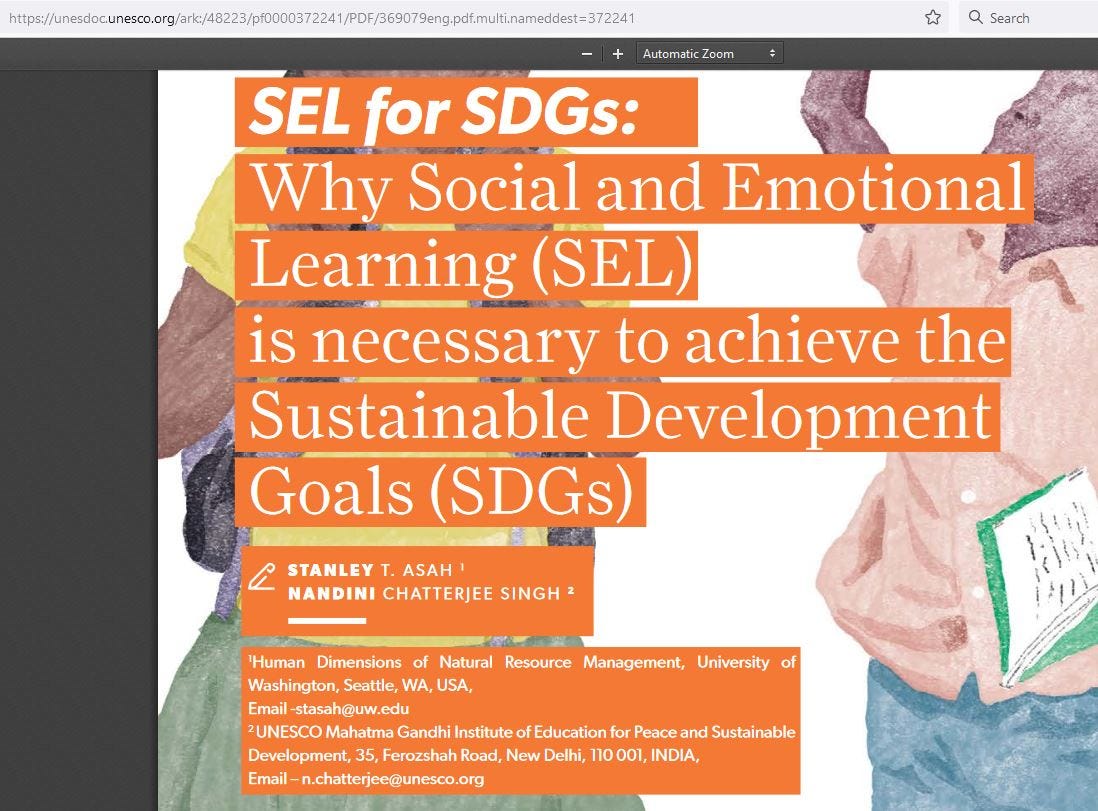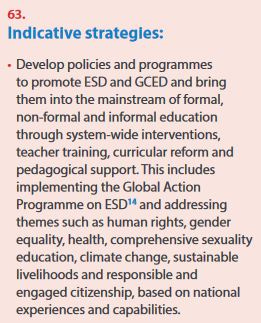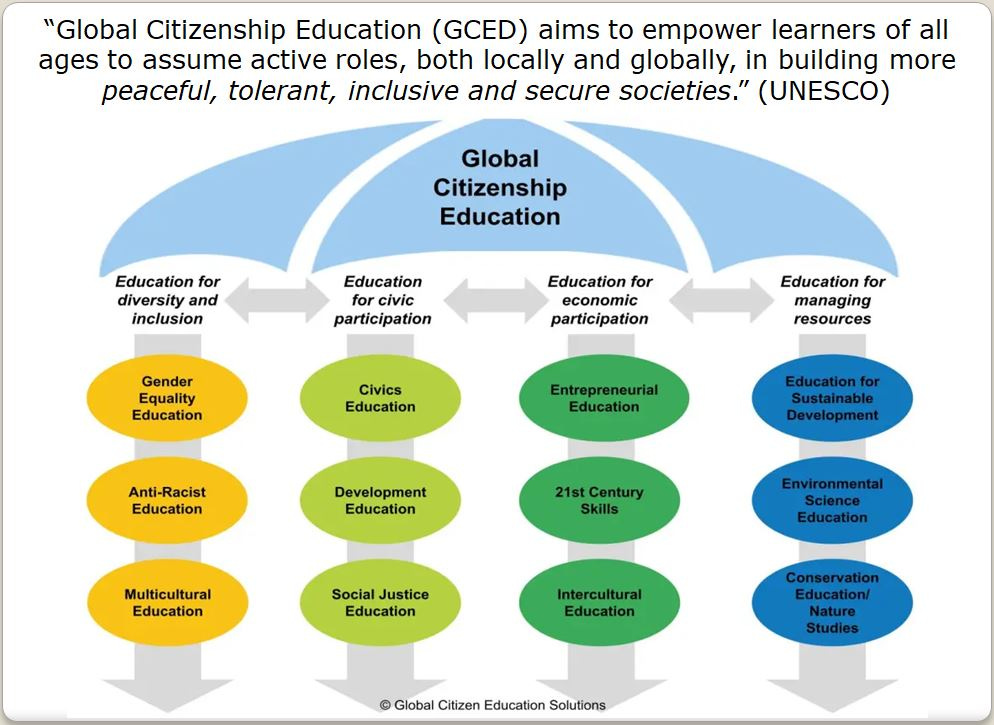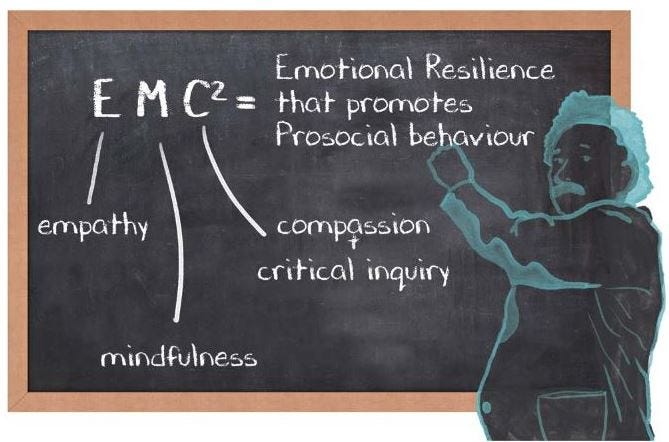SEL for SDGs
Why Social Emotional Learning is necessary to achieve the U.N.'s Sustainable Development Goals
What is the purpose of education? If you ask the CEO of Bank of America, Brian Moynihan, he’ll tell you it’s to create human capital to serve the interests of businesses’ future Environmental Social & Corporate Governance (ESG) scores. Based on his own words in the video at the top of this article, ESG scores were clearly fueled by and based around the Sustainable Development Goals (SDGs) of the United Nations. The same can be said about the initiative to bring mental health programs into schools that teach the “correct” values, attitudes, and beliefs through social and emotional learning (SEL). Through SEL and ESG, both businesses and people alike will be ‘nudged’ into supporting the U.N.’s 2030 agenda.
Social emotional learning (or SEL) is the biggest thrust in education right now and is described as “the process through which children acquire the skills to recognize and manage emotions, develop caring and concern for others, make responsible decisions, establish positive relationships, and handle challenging situations effectively.” (CASEL)
The Collaborative for Academic Social and Emotional Learning (CASEL) elected themselves the standard-bearers of SEL, and as such, makes sure that all SEL programs line up with the definition they set as well as their 5-Core Competencies. They rate and review SEL programs based on these standards, and many states won’t even accept SEL programs that aren’t “CASEL-approved.” In 2020, amidst the chaos of the global pandemic and racial riots, CASEL quietly updated that definition and their 5-Core Competencies. Their new definition of Transformative SEL and adjusted competencies reflect the view that social and emotional learning needs to be taught through a racial and equity lens. Not only is it "transformative," it's inculturative. The ideas children are supposed to form about themselves are intended not to effect change just on the individual level but to create a collective ethos. The purpose of social emotional learning is to “make explicit issues such as power, privilege, prejudice, discrimination, social justice, empowerment, and self determination” with the goal of developing “justice-oriented, global citizens.”
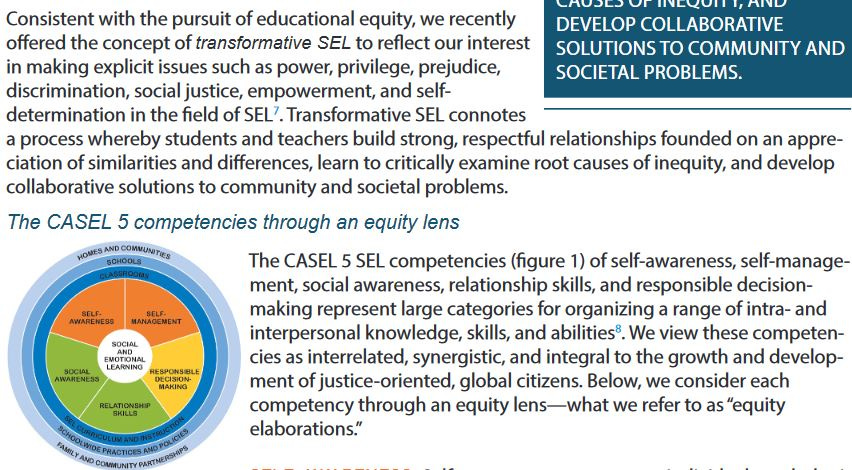
CASEL has no qualms about acknowledging that the global movement to ingrain social and emotional learning into school districts all over the nation is being used to influence the progress toward the U.N.’s Sustainable Development Goals. During their 2019 SEL Exchange panel, SEL and the Global Movement, a moderator from CASEL asked UNESCO’s Dr. Anantha Duraiappah to weigh in on that very topic. He specifically addressed how social and emotional learning could be used to advance Sustainable Development Goal 4: Quality & Inclusive Education for All. How does UNESCO view quality and inclusive education? They lay it out in their Education 2030 document:
UNESCO’s strategy is to “develop policies and programmes” (along with their partners) to promote Education for Sustainable Development (ESD) and Global Citizenship Education (GCED) and “bring them into the mainstream of formal, non-formal and informal education through system-wide interventions.”
Both GCED and ESD address themes that line up with the U.N.’s Sustainable Development Goals - including climate change, comprehensive sexuality education (promoting sexual rights for children as young as 4), and social justice activism for racial and gender causes (especially LGBTQIA+). The goal is to teach children collectivism (a political theory associated with communism that people should prioritize the good of society over the welfare of the individual), which UNESCO themselves acknowledge is difficult because it causes a state of cognitive dissonance. This “can be caused by beliefs, attitudes, values and feelings about oneself, others or the environment,” that a student has already adopted as a part of their family or culture. When students are confronted with the Sustainable Development Goals, some of which require them to reject those ingrained values, attitudes and beliefs and adopt a different worldview, they might perceive the “development goal in a more negative light,” and that (to UNESCO’s dismay) “discourages actions toward pursuit of SDGs.”
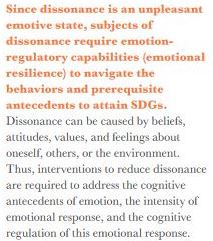
UNESCO prescribes “interventions to reduce dissonance” and go on to say that teaching social and emotional learning in schools “shows promise in improving pro-social behavior and inculcating actions that go beyond just the self but towards the collective good…The objective is therefore towards building emotionally resilient individuals who are able to navigate the complex landscape of conflicting goals and dissonance to one of prosocial behavior that promotes human flourishing and the attainment of the SDGs.” Their solution is to brainwash children through what they call EMC2.
“C2” is for compassion and critical inquiry (cough: Critical Theory/Identity Marxism). Students are manipulated through social and emotional learning to believe that all systems are set up to oppress certain groups of people and that in order to have empathy, they must display compassion (do something) to try and fix it. In other words, they need to become activists for the targets of the United Nations’ Sustainable Development Goals.
It’s clear that this “radical change in our education systems” that UNESCO suggests has been fully embraced by the United States Department of Education (DOE), which has aggressively incentivized and encouraged the adoption of SEL programs through COVID relief funding. On October 19, 2021, the U.S. DOE released “New Resources on Supporting Child and Student Social, Emotional, Behavioral and Mental Health during Covid-19 Era.” In it, Secretary of Education Miguel Cardona stated, “Our efforts as educators must go beyond literacy, math, history, science, and other core subjects to include helping students to build the social, emotional, and behavioral skills they will need to fully access and participate in learning and make the most of their potential and future opportunities.” He stressed that American Rescue Plan/ESSER funds alone had $122 billion available for SEL supports. The Ed Covid-19 Handbook – Roadmap to Reopening Safely and Meeting All Student’s Needs has an entire chapter on meeting the social, emotional, and mental health needs of students, using SEL as the platform, with a direct link to CASEL’s website.
It should come as no surprise that the former CEO of CASEL, Karen Niemi, as well as 4 members of Committee for Children (the parent company of the most widely used SEL program in the nation-Second Step) serve on the Global Steering Committee of Karanga, “The Global Alliance for Social Emotional Learning & Life Skills.” Karanga was born out of the Salzburg Global Seminar, where founder Louka Parry planted the seeds for this global organization, culminating in a trip to DC where they wrote "a preliminary position paper on what this global alliance could do & how it could contribute to the (SEL) ecosystem." The position paper reveals how SEL can be positioned as their opportunity for education reform because "change is not happening fast or widely enough to…help societies rise to the challenges of the Sustainable Development Goals."
It’s no coincidence that these key players from the SEL industry in the United States serve on the Global Steering Committee with other countries’ SEL proponents along with UNESCO’s Dr. Anantha Duraiappah. CASEL’s mission to unite education and workforce policy through an SEL lens explains how the objectives of the U.N.’s SDGs have infiltrated both the U.S. education system as well as the corporate accountability/social credit system of ESGs. SEL instruction, like that taught through the program Second Step, delivers the ideologically compliant workforce that ESG demands.
While American parents have been sending their kids to school thinking that they’re getting academic instruction, what has actually been happening is that their children have been participating in a global Maoist thought reform program bent on altering their children’s values, attitudes and beliefs. Social Emotional Learning is "psychological intervention as a means to economic ends"; it's about producing human capital in service to global ESG compliance. To boost their ESG scores, companies will eventually be forced to hire candidates based on their SEL scores (gathered from SEL assessments) which measure students’ acquisition of what are considered the “correct” perspectives. Candidates who have chosen to reject the worldview in favor of the U.N.’s SDGs need not apply.

